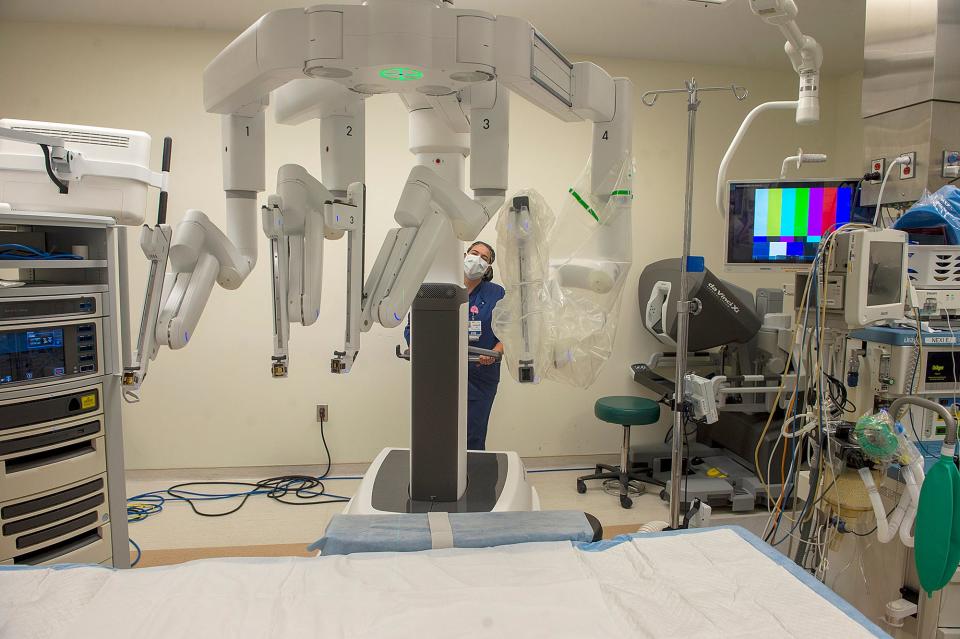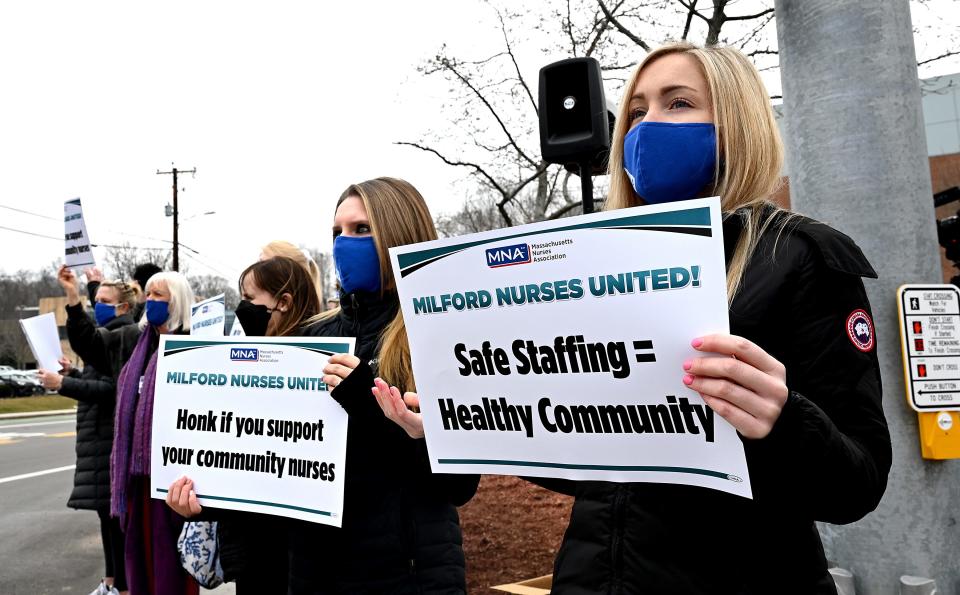Milford Regional nurses unionized in February 2021. Now they have a contract
MILFORD — Nearly 21 months after nurses at Milford Regional Medical Center voted to unionize with the Massachusetts Nurses Association, they are celebrating their first contract.
The hospital's more than 500 registered nurses voted overwhelmingly last week to ratify their first collective bargaining agreement, which they say improves patient care, working conditions, wages and benefits.
Negotiations with the hospital had been ongoing for more than a year.
“We just want people to have a good day," said Sara Burton, a co-chair of the bargaining committee. "We are great nurses. We know how to do a good job. But what’s been so distressing about the last few years is that you can’t do a good job. You don’t have the resources or the support you need.”

Burton added that the new contract "will immediately benefit nurses and patients and will make a positive impact in our community for years to come.”
Earlier: Milford Regional Medical Center nurses unionized a year ago. Now they seek first contract
According to a statement from the MNA, highlights of the new agreement include:
Nurses will receive an increase each year through the establishment of a wage step scale that guarantees them annual raises. There will be 4% between each step, with a nurse’s placement on the scale depending on skill year and retroactive pay to April 3, 2022
In addition to the scale and its associated annual raises, there will be a total of 8.5% across-the-board raises for every nurse over the next two years
The contract guarantees that charge nurses will be without a patient assignment or have a reduced patient assignment on in-patient units. Nurse educators will be an additional resource during the 3 p.m.-to-7 a.m. period
Overtime will take effect once nurses begin working one hour past their shift, or more than 40 hours in a week
For health insurance purposes, nurses will be considered full time at 32 hours per week
The securing of just cause, a universally recognized standard in labor law. This provides nurses protection against arbitrary or unfair discipline. It also helps ensure that nurses can advocate for patients and colleagues without fear of retaliation
A grievance and arbitration process.

“I definitely think that we felt like we were part of something bigger,” Burton said. “I don’t think there are real villains, necessarily, but I think health care has become such a business that the fundamental interests of the hospital are different than the fundamental interests of the nurses themselves.”
'Culture of fear': MNA says it will explore legal action after two Milford Regional nurses are fired
In a written statement, Vice President of Patient Care Services and Chief Nursing Officer Judy Kelly said the hospital is “pleased with the Nov. 16 ratification of the first contract between Milford Regional Medical Center and the Massachusetts Nurses Association.”
Kelly added that the agreement would help with staff attraction and retention, provide competitive wages and help the hospital focus on quality care.
“We appreciate the work of all the participants in the negotiation process who were consistently professional, collaborative and mutually committed to reaching a fair sustainable agreement,” she said.
Nurses say retention a key goal
In regards to the raises, Burton said the market for nurses is "really competitive," and that they often aren't paid as much to serve smaller hospitals as they are at big urban centers. She said the new deal has benefits that help make the trade-off worth it, and that will help with retention.
“Knowing that you’re getting paid less to do more work and you have such terrible experiences, you kind of start to think, well, maybe I should just go somewhere else,” Burton said. “It’ll be the same garbage, but I’d be getting paid more.”
'Hub of our community': Milford Regional is among top-rated community hospitals
Nurses are often paid more competitively if they take another job and then return to the hospital for a better salary. But having staff constantly cycle through the system that way can make the job more difficult, and the pandemic made turnover worse, Burton said.
“What we really want to focus on is retention of nurses — hiring and keeping good nurses at the hospital,” she said. “You can build teamwork that way. You get institutional knowledge. You just get better at your job.”

She added that the added resources of a charge nurse and nurse educators are especially crucial for the emergency room, which "has been slammed recently."
“If that workload is overwhelming, all of the other important things that maybe aren’t hair-on-fire crises don’t get done,” she said, including checking in on patients who aren’t experiencing those crises.
Help from FEMA: Milford Regional receives nearly $1.6 million to help combat COVID-19
Burton said it seemed like hospital administrators were “on the same page” about making it work — but added that the situation in health care as a whole is not going to be fixed with one ratification.
"We were really, really lucky that we've finally gotten to this point," Burton said. But in health care overall, "frankly, things are still really bad."
Union won't fix everything
Burton, who has been at Milford Regional since graduating from nursing school in 2008, said that even though she loves her job, she realized the system didn't always serve staff or patients, with nurses often doing more than one person’s job.
She said she became somewhat disillusioned and frustrated working with the administration — and then the pandemic hit. Staff were reusing masks, volunteers were ironing together gowns from huge sheets of plastic — jokingly called “garbage bags.”

Burton then decided to get involved in a union effort.
“It was just very disheartening and very scary," she said. "And the experience showed us the hospital was unable — or unwilling — to help us improve things. If something was going to change, we needed to do it ourselves.”
She noted that hospital capacity — whether it be for COVID-19 or other widespread illnesses — is a really late indicator of community health, and the system does not have a lot of slack built in. She said the term "burnout" isn’t adequate enough in describing the extended level of demand and stress that health care workers have experienced in the past few years.
“We’re all damaged, and health care is really on the verge of being unsafe, and that’s the last thing anyone wants,” she said. “Our union is a wonderful, wonderful win — but things are still really, really hard.”
This article originally appeared on The Milford Daily News: Milford Regional nurses have first collective bargaining agreement
